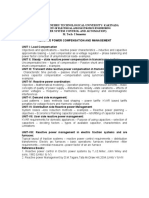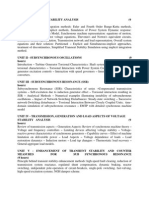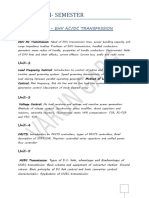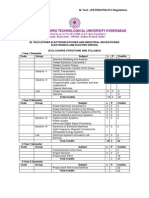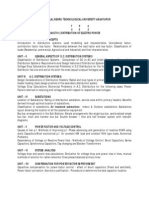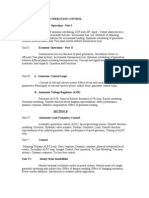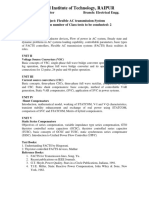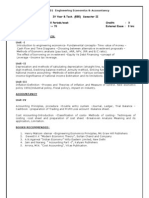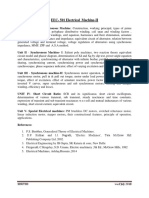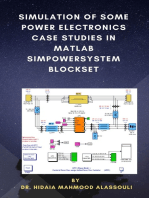Psoc
Psoc
Uploaded by
Subrahmanya SarmaCopyright:
Available Formats
Psoc
Psoc
Uploaded by
Subrahmanya SarmaOriginal Description:
Original Title
Copyright
Available Formats
Share this document
Did you find this document useful?
Is this content inappropriate?
Copyright:
Available Formats
Psoc
Psoc
Uploaded by
Subrahmanya SarmaCopyright:
Available Formats
JAWAHARLAL
NEHRU TECHNOLOGICAL UNIVERSITY KAKINADA POWER SYSTEM OPERATION AND CONTROL
Objective : This subject deals with Economic operation of Power Systems, Hydrothermal schedulings and modeling of turbines, generators and automatic controllers. It emphasizes on single area and two area load frequency control and reactive power control. UNIT I Economic Operation of Power Systems-1 Optimal operation of Generators in Thermal Power Stations, - heat rate Curve Cost Curve Incremental fuel and Production costs, input-output characteristics, Optimum generation allocation with line losses neglected. UNIT II Economic Operation of Power Systems-2 Optimum generation allocation including the effect of transmission line losses Loss Coefficients, General transmission line loss formula. UNIT III Hydrothermal Scheduling Optimal scheduling of Hydrothermal System: Hydroelectric power plant models, Scheduling problems- Short term Hydrothermal scheduling problem. UNIT IV Modelling of Turbine, Generator and Automatic Controllers Modelling of Turbine: First order Turbine model, Block Diagram representation of Steam Turbines and Approximate Linear Models. Modelling of Generator (Steady State and Transient Models): Description of Simplified Network Model of a Synchronous Machine (Classical Model), Description of Swing Equation (No Derivation) and State-Space IIOrder Mathematical Model of Synchronous Machine. Modelling of Governor: Mathematical Modelling of Speed Governing System Derivation of small signal transfer function. Modelling of Excitation System: Fundamental Characteristics of an Excitation system, Ttransfer function, Block Diagram Representation of IEEE Type-1 Model UNIT V Single Area Load Frequency Control Necessity of keeping frequency constant. Definitions of Control area Single area control Block diagram representation of an isolated power system Steady state analysis Dynamic response Uncontrolled case. UNIT VI Two-Area Load Frequency Control Load frequency control of 2-area system uncontrolled case and controlled case, tie-line bias control UNIT-VII Load Frequency Controllers Proportional plus Integral control of single area and its block diagram representation, response Load Frequency Control and Economic dispatch control. UNIT VIII Reactive Power Control Overview of Reactive Power control Reactive Power compensation in transmission systems advantages and disadvantages of different types of compensating equipment for transmission systems; load compensation Specifications of load compensator, Uncompensated and compensated transmission lines: shunt and Series Compensation. TEXT BOOKS: 1. Electrical Power Systems by C.L.Wadhwa, Newage International-3rd Edition 2. Modern Power System Analysis by I.J.Nagrath & D.P.Kothari Tata M Graw Hill Publishing Company Ltd, 2nd edition. REFERENCE BOOKS: 1. Power System Analysis and Design by J.Duncan Glover and M.S.Sarma., THOMPSON, 3rd Edition. 2. Electric Energy systems Theory by O.I.Elgerd, Tata Mc Graw-hill Publishing Company Ltd., Second edition. 3. Power System Analysis by Grainger and Stevenson, Tata McGraw Hill. 4. Power System Analysis by Hadi Saadat TMH Edition. steady state
UNIT-1 Economic Operation of Power Systems-1
You might also like
- Jntuk Eee 4-2 Sem Syllabus Book (R10)Document23 pagesJntuk Eee 4-2 Sem Syllabus Book (R10)Venkat KickNo ratings yet
- Syllabus of Jntu IV - I Psoc 08 Batch R 07Document2 pagesSyllabus of Jntu IV - I Psoc 08 Batch R 07Krishna Prasad100% (1)
- PSOCDocument2 pagesPSOCSai Pavan Kumar NandigamNo ratings yet
- Syllabus: Unit-I: Economic Operation of Power SystemsDocument2 pagesSyllabus: Unit-I: Economic Operation of Power Systemsi sai ramNo ratings yet
- RPCMDocument1 pageRPCMSA S CNo ratings yet
- Syllabus EEE 2019Document5 pagesSyllabus EEE 2019jaberyemeniNo ratings yet
- PsocDocument1 pagePsocGayan ShashiNo ratings yet
- Construction of Swimming PoolDocument4 pagesConstruction of Swimming Pooldahsra4uNo ratings yet
- EPSDocument31 pagesEPSChakala BhargavNo ratings yet
- EPSDocument28 pagesEPSChakala BhargavNo ratings yet
- JFTTRHGHMJBDocument21 pagesJFTTRHGHMJBBikash Ranjan DashNo ratings yet
- Ee2401 Power System Operation and ControlDocument2 pagesEe2401 Power System Operation and Controlsshivakumar98No ratings yet
- EE2401 POWER SYSTEM OPERATION AND CONTROL Syllabus Regulation 2008Document2 pagesEE2401 POWER SYSTEM OPERATION AND CONTROL Syllabus Regulation 2008Muruga RajNo ratings yet
- EE8702 - PSOC Syllabus 2017RDocument2 pagesEE8702 - PSOC Syllabus 2017RRaja Sekar100% (2)
- B. Tech. Viii-Semester: 8ee1 - Ehv Ac/Dc TransmissionDocument5 pagesB. Tech. Viii-Semester: 8ee1 - Ehv Ac/Dc TransmissionVaRun GaRgNo ratings yet
- JNTUH M.TECH PEDS 2013 SyllabusDocument24 pagesJNTUH M.TECH PEDS 2013 SyllabusSRINIVASA RAO GANTA100% (1)
- Power ElectronicsDocument24 pagesPower ElectronicsSunilkumarNo ratings yet
- 4 Psoc As Aurora CollegeDocument56 pages4 Psoc As Aurora CollegeKvv BapirajuNo ratings yet
- Eeguc: Unit I Power GenerationDocument3 pagesEeguc: Unit I Power GenerationJagadeesh MannivannanNo ratings yet
- Distribution of Electric Power PDFDocument2 pagesDistribution of Electric Power PDFJosua Sudrajat Marbun67% (6)
- Power System Analysis Syallbus MG Univ KeralaDocument1 pagePower System Analysis Syallbus MG Univ KeralaChristy CyriacNo ratings yet
- Power System and Operation ControlDocument2 pagesPower System and Operation ControlAtul TekadeNo ratings yet
- Jawaharlal Nehru Technological UniversityDocument5 pagesJawaharlal Nehru Technological UniversityMahesh J. UmaNo ratings yet
- Psoc Syllabus Jntuh IV EeeDocument2 pagesPsoc Syllabus Jntuh IV EeeRaghavendar InguvaNo ratings yet
- Ee6501 Power System AnalysisDocument2 pagesEe6501 Power System AnalysiskrishnandrkNo ratings yet
- Ee2351 PsaDocument2 pagesEe2351 PsaanbuelectricalNo ratings yet
- Ee8702 Power System Operation and Control SyllabusDocument2 pagesEe8702 Power System Operation and Control SyllabusDark Wizard StudiosNo ratings yet
- Mtech Eee2011Document30 pagesMtech Eee2011vinayaka_murugan100% (1)
- II Power System (SY) 060511014443 PDFDocument5 pagesII Power System (SY) 060511014443 PDFvims1240% (1)
- Ps 9221 Power System ProtectionDocument24 pagesPs 9221 Power System Protectionsyed1188No ratings yet
- PHD Entrance TestDocument3 pagesPHD Entrance TestmjrsudhakarNo ratings yet
- PrudviallaDocument4 pagesPrudviallaPrudhvi AllaNo ratings yet
- FRM Download FileDocument11 pagesFRM Download FileUmang MewaraNo ratings yet
- Distrubution of PowerDocument175 pagesDistrubution of PowerMuhammadMunirMalikNo ratings yet
- 5TH Sem SyllabusDocument16 pages5TH Sem SyllabusHunter HarshaNo ratings yet
- Syllabus For M.Tech Sponsored ElectricalDocument3 pagesSyllabus For M.Tech Sponsored ElectricalArsalaan NazeerNo ratings yet
- 3012Document4 pages3012k vasanthiNo ratings yet
- Sgbau SyllabusDocument6 pagesSgbau SyllabusRavishankar KankaleNo ratings yet
- Electri Sem 8Document4 pagesElectri Sem 8Ajeet KumarNo ratings yet
- ASDFDocument1 pageASDFamulya00428No ratings yet
- Power System Operation & ControlDocument73 pagesPower System Operation & ControlDr. Moh DoshanNo ratings yet
- PSA NotesDocument67 pagesPSA NotesPriyankaNo ratings yet
- FRM Download FileDocument16 pagesFRM Download Fileakash2003bhardwajNo ratings yet
- EEE 4-1 SyllubusDocument10 pagesEEE 4-1 SyllubusSai ChanduNo ratings yet
- Aps, PS, Pse, PSC, E&pe, Eps, Psc&a, Psc&ae PDFDocument16 pagesAps, PS, Pse, PSC, E&pe, Eps, Psc&a, Psc&ae PDFKVSR SEKHARNo ratings yet
- SyllabusDocument6 pagesSyllabusAnudeep ChimakurthiNo ratings yet
- GeiDocument2 pagesGeisansureNo ratings yet
- Ee2351 Power System Analysis L T P C 3 1 0 4Document9 pagesEe2351 Power System Analysis L T P C 3 1 0 4Suba SruthiNo ratings yet
- CBGS 8 Sem050318033746 PDFDocument9 pagesCBGS 8 Sem050318033746 PDFshashank barsainyaNo ratings yet
- EEC-501 Electrical Machine-II: Basics of Synchronous MachineDocument15 pagesEEC-501 Electrical Machine-II: Basics of Synchronous Machineyour friendNo ratings yet
- II Power System (SY) 060511014443Document5 pagesII Power System (SY) 060511014443Ankur TamrakarNo ratings yet
- Syllabus: EEE509 Power System Operation and ControlDocument2 pagesSyllabus: EEE509 Power System Operation and ControlMichael Zontche BernardNo ratings yet
- Module3 and 4Document73 pagesModule3 and 4sahitNo ratings yet
- Simulation of Some Power System, Control System and Power Electronics Case Studies Using Matlab and PowerWorld SimulatorFrom EverandSimulation of Some Power System, Control System and Power Electronics Case Studies Using Matlab and PowerWorld SimulatorNo ratings yet
- Power Electronics: Lecture Notes of Power Electronics CourseFrom EverandPower Electronics: Lecture Notes of Power Electronics CourseNo ratings yet
- Investigation of the Usefulness of the PowerWorld Simulator Program: Developed by "Glover, Overbye & Sarma" in the Solution of Power System ProblemsFrom EverandInvestigation of the Usefulness of the PowerWorld Simulator Program: Developed by "Glover, Overbye & Sarma" in the Solution of Power System ProblemsNo ratings yet
- Simulation of Some Power Electronics Case Studies in Matlab Simpowersystem BlocksetFrom EverandSimulation of Some Power Electronics Case Studies in Matlab Simpowersystem BlocksetNo ratings yet
- Simulation of Some Power Electronics Case Studies in Matlab Simpowersystem BlocksetFrom EverandSimulation of Some Power Electronics Case Studies in Matlab Simpowersystem BlocksetRating: 2 out of 5 stars2/5 (1)
- Some Power Electronics Case Studies Using Matlab Simpowersystem BlocksetFrom EverandSome Power Electronics Case Studies Using Matlab Simpowersystem BlocksetNo ratings yet




